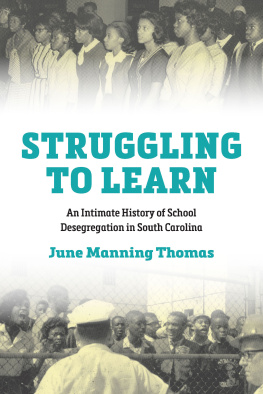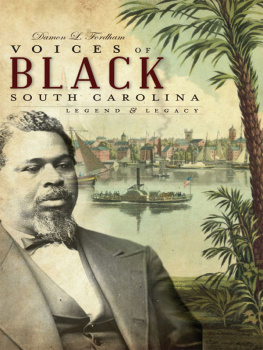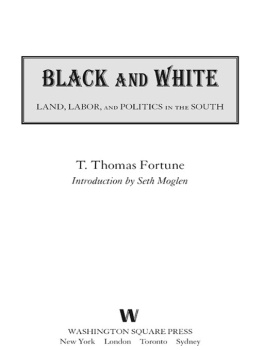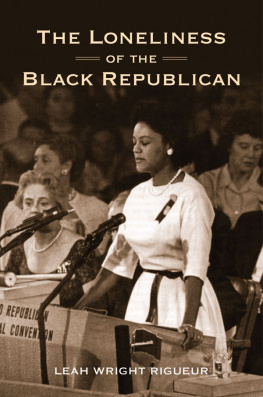University of Virginia Press
2016 by the Rector and Visitors of the University of Virginia
All rights reserved
Printed in the United States of America on acid-free paper
First published 2016
1 3 5 7 9 8 6 4 2
Library of Congress Cataloging-in-Publication Data
Names: Dinnella-Borrego, Luis-Alejandro, author.
Title: The risen phoenix : Black politics in the postCivil War South / Luis-Alejandro Dinnella-Borrego.
Description: Charlottesville : University of Virginia Press, 2016. | Series: The American South series | Includes bibliographical references and index.
Identifiers: lccn 2016001877| isbn 9780813938745 (cloth : alk. paper) | isbn 9780813938738 (e-book)
Subjects: lcsh: African Americans Southern States Politics and government 19th century. | Southern States Politics and government 18651950. | Southern States Race relations History 19th century.
Classification: lcc e185.6 .d56 2016 | ddc 323.1196/07307509034 dc23 lc record available at http://lccn.loc.gov/2016001877
Cover art: Making His First Speech in the House of Representatives,
January 16, 1891, C. H. Warren, 1894. Illustration from John Mercer
Langstons autobiography, From the Virginia Plantation to the National Capitol.
(E185.97 .l27 1894, Special Collections, University of Virginia)
THE AMERICAN SOUTH SERIES
Elizabeth R. Varon and Orville Vernon Burton
EDITORS
To the memory of my grandparents, who taught me the real meaning of history
Jos Anbal Borrego (March 19, 1927 November 29, 2012) Irma Alicia Gordillo (October 28, 1928 November 6, 2013)
Luciano Dinnella (August 9, 1917 August 31, 2014) Giuseppina Anna Brusca (October 8, 1918 January 6, 1993)
And to my parents, Louis John Dinnella and Maria Grisell Borrego, who have supported me in all my endeavors and taught me never to lose faith
Hold onto dreams,
For if dreams die,
Life is like a broken-winged bird
That cannot fly.
Hold fast to dreams,
For when dreams go,
Life is a barren field
Frozen with snow.
Langston Hughes, Dreams
ACKNOWLEDGMENTS
I HAVE ACCUMULATED many debts over the years, and I appreciate the chance to repay some of them here. My adviser, Sheila Culbert, and her wonderful husband, Richard Wright, supported me during my time at Dartmouth College, as did many teachers in the history and theater departments: Craig Wilder, Edward Miller, David Lagomarsino, Walter Simons, Tanals Padilla, Marysa Navarro, Annalise Orleck, Amy Holzapfel, James Rice, Peter Hackett, Mara Sabinson, and Laura Edmondson. My growth as a historian accelerated at the University of Virginia. Along these lines, I must thank my adviser, Michael F. Holt, and my teachers at the Corcoran Department of History: Peter Onuf, Gary Gallagher, Olivier Zunz, and Mark Thomas. My teachers in the Department of History at Rutgers University were inspiring and helped expand my intellectual horizons. I feel a great sense of gratitude to Seth Koven, Paul Clemens, Peter Silver, Virginia Yans, Donna Murch, David Foglesong, Minkah Makalani, Jennifer Mittlestadt, and Deborah Gray White. My doctoral advisers, Ann Fabian and Mia Bay, read drafts with patience. I also wish to thank my other committee members: David Greenberg, Jackson Lears, and Eric Foner of Columbia University. The departments staff Dawn Ruskai and Candace Wolcott-Shepherd helped make my stay at Rutgers enjoyable and incredibly productive.
I must thank the staffs and archivists whom I met in person as I traveled across the South on a whirlwind tour ahead of the aptly named Hurricane Isaac, especially the good folks at the Mississippi Department of Archives and History in Jackson; the Alabama Department of Archives and History in Montgomery; the National Archives and Records Administration Southeast Region at Morrow, Georgia; the State Records Center and the State Archives of North Carolina (both in Raleigh); and the Virginia Historical Society in Richmond. Id like to single out Anne L. Webster at the Mississippi Department of Archives and History and LeRae Sikes Umfleet at the State Archives of North Carolina for pulling out all the stops and helping make my research easier than it otherwise would have been.
My research required repeated trips to Washington, D.C., and to New York City. The librarians at the Schomburg Center for Research in Black Culture at the New York Public Library were incredibly helpful. I also want to thank the librarians at the Manuscripts Division and at the Newspapers and Current Periodicals Reading Room of the Library of Congress in Washington, D.C. At Howard University, I greatly appreciated help from Ida E. Jones and Joellen ElBashir of the Manuscript Division of the Moorland-Spingarn Research Center. Finally, Tab Lewis at Archives II in College Park, Maryland, suffered through what must have seemed to be mind-numbingly vague citations of Treasury Department records. At the National Archives and Records Administration Center for Legislative Archives, Richard McCulley, Richard Hunt, Christine Blackerby, and Allison Noyes put up with me as an undergraduate intern and provided insightful research opportunities. Richard McCulley has remained a steadfast friend and advocate, always willing to talk shop with me over coffee or lunch during several of my visits to Washington. Christine Blackerby generously gave me access to her invaluable research on black congressional policy.
Funding for this project was made possible by a fellowship from the Rutgers University History Department, as well as generous Summer Research Grants provided by the department via the Andrew W. Mellon Foundation. The Jacob K. Javits Fellowship Program of the U.S. Department of Education provided much financial support, and I wish to thank Sara Stark, Carmen Gordon, Harvey Waterman, and especially Simona Turcu. I also thank the Social Science Research Council Mellon Mays Graduate Initiatives program for its small grants that helped keep me afloat during my research; specifically, I am grateful to program director Cally Waite and especially Adam Radwan. I would not have benefited from this support had it not been for the Mellon Mays Undergraduate Fellowship Program.
I must thank an amazing group of mentors, historians, and old friends, including: Louis Moore, John Domville, Elizabeth Terry, Kiran Parkhe, Matt Maccani, Iden Sinai, Will Kurtz, Peter Cruz, Stacy Sewell, Anthony Troncone, Stephanie Jones-Rogers, Pat McGrath, Ben Resnick-Day, Christina Chiknas, Adrienne Harrison, Gretchen Heaton, Adam Wolkoff, Matt Loprieno, Paul Hartung, Steve Olszowy, Tom Hazlett, Frank Seuffert, Thomas (Jong-Hun) Nah, and Bobby Davies. Brian W. Johnson was always willing to drop whatever he was doing to take me and my family to Kennedy Airport. I also thank my brothers and sisters in the Neocatechumenal Way the Third Community of Our Lady of Mount Carmel in Ridgewood, New Jersey.
Special thanks are reserved here for my second family Mark and Tara Hart and company (Joseph, Sarah, John Paul, Catherine, Patrick, Simon, and Monica). As always, I must thank my catechists from back home Mike, Ann, Bob, Joan, Stefano, Elizabeth, and Fr. Kevin Waymel. I must also thank a few others: Faith (Brancale) Jablonsky; Emma Seuffert; Josephine Perez; Ken Quintilian; Marianne Titus; Joan Clifford; Bob and Mary Allison; Avilio and Yamilka Genao; Jack, Joan, and John Craig; Auxiliary Bishop Peter Baldachinno of Miami; Fr. Ivan Sciberras; Fr. Sean Manson; Fr. Raul Silva; and the pastor of Mount Carmel, Fr. Ronald J. Rozniak. Finally, Fr. Tony Medeiross patience was legendary, and I am deeply thankful for his support throughout the process. Several seminarians at the Redemptoris Mater Seminary of Boston put up with this project in various ways; I single out here Leonardo Moreira, Mauricio Acosta, Kevin Pleitez, Vincenzo Vinnie C Caruso, Mateus Oliveira Martin, and








